Tiếng Anh 9 Unit 1: Lesson 1 Soạn Anh 9 i-Learn Smart World trang 4, 5, 6, 7
Tiếng Anh 9 Unit 1: Lesson 1 giúp các em học sinh lớp 9 trả lời các câu hỏi trang 4, 5, 6, 7 Tiếng Anh 9 sách i-Learn Smart World để chuẩn bị bài Unit 1: English in the World trước khi đến lớp.
Soạn Lesson 1 Unit 1 lớp 9 bám sát theo chương trình SGK i-Learn Smart World 9. Thông qua đó, giúp học sinh nhanh chóng nắm vững kiến thức để học tốt tiếng Anh 9. Đồng thời, cũng giúp thầy cô tham khảo để soạn giáo án Tiếng Anh 9 theo chương trình mới. Mời thầy cô và các em cùng theo dõi bài viết dưới đây của Eballsviet.com:
Soạn Anh 9 Unit 1: Lesson 1 i-Learn Smart World
Let's Talk!
In pairs: Look at the pictures. What are these people doing to improve their English? What do you do to improve your English in your free time?
(Theo cặp: Quan sát các bức tranh. Những người này đang làm gì để cải thiện tiếng Anh của họ? Bạn làm gì để cải thiện tiếng Anh trong thời gian rảnh?)
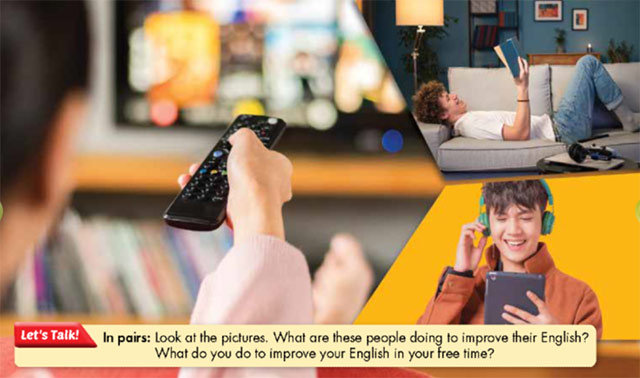
Gợi ý đáp án
- They are watching TV programmes in English, reading books in English and listening to music in English.
- In my free time, to improve my English I usually listen to English songs, watch English films, read newspapers in English, write anything I like in English and speak in English with foreigners in my neighbourhood.
New Words
a. Read the sentences, then match the words to the definitions. Listen and repeat.
(Đọc các câu, sau đó ghép các từ với định nghĩa tương ứng. Nghe và lặp lại.)
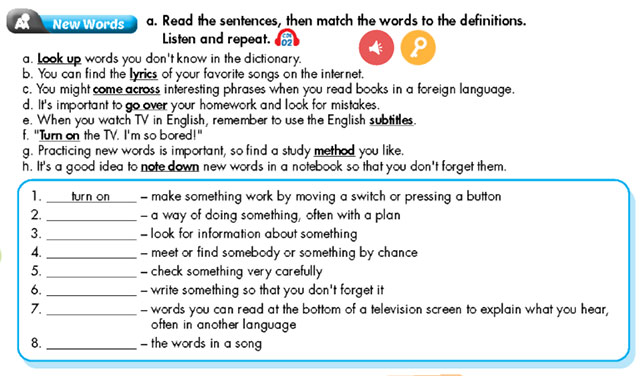
Gợi ý đáp án
|
1. turn on |
2. method |
3. look up |
4. come across |
|
5. go over |
6. note down |
7. subtitles |
8. lyrics |
b. In pairs: Use the new words to talk about what you like to read, watch, or listen to in English.
(Làm việc theo cặp: Sử dụng các từ mới ở trên để nói về cái mà bạn muốn đọc hoặc nghe trong Tiếng Anh.)

Gợi ý đáp án
A: I enjoy reading articles and books in English because it allows me to look up new words and phrases that I encounter.
B: Sometimes, while reading, I come across interesting idioms or expressions that I make sure to note down in my notebook so that I don't forget them.
A: When it comes to watching TV shows or movies, I prefer to turn on the English subtitles. This helps me understand the dialogue better, and I can also learn new vocabulary from the subtitles.
B: As for music, I love listening to songs in English and paying attention to the lyrics. It's fascinating to analyze the lyrics and find deeper meanings behind them.
Reading
a. Read the online article about English study methods. What is the passage mainly about?
(Đọc bài viết trực tuyến về các phương pháp học tiếng Anh. Đoạn văn chính là về gì?)
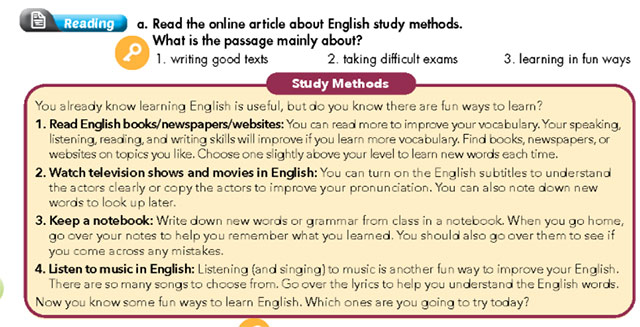
Gợi ý đáp án
3. having in fun ways
b. Now, read and fill in the blanks.
(Bây giờ, đọc và điền vào chỗ trống.)

Gợi ý đáp án
|
1. vocabulary |
2. websites/ newspapers |
3. note down |
|
4. remember |
5. lyrics |
c. Listen and read.
(Nghe và đọc lại.)
d. In pairs: Which English study methods do you want to try? Why?
(Thảo luận theo cặp: Phương pháp học Tiếng Anh nào mà bạn muốn thử? Tại sao?)
Gợi ý đáp án
A: Which English study methods do you want to try?
B: I want to try language games.
A: Why?
B: Because playing language-learning games or quizzes designed to reinforce vocabulary, grammar, and comprehension skills in a fun and interactive way is really effective and relaxing. By this method, I can remember vocabulary more easily and undersatnd grammar better.
Grammar
a. Read about to-infinitives and phrasal verbs, then fill in the blanks.
(Đọc về to V và cụm động từ, sau đó điền vào chỗ trống.)
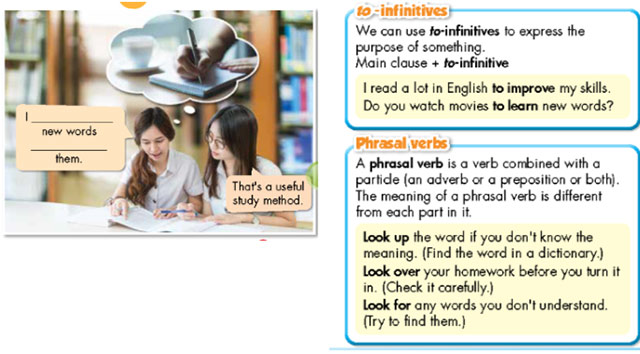
Gợi ý đáp án
I note down new words to remember them. That’s a useful study method.
b. Listen and check. Listen again and repeat.
(Nghe và kiểm tra. Nghe và nhắc lại.)
c. Circle the correct words.
(Khoanh chọn từ đúng.)

Gợi ý đáp án
|
1. across - improve |
2. up - to know |
3. it down - to help |
|
4. over - find |
5. them on - understand |
d. Match the actions to the purposes, then write complete sentences.
(Nối hành động với mục đích, sau đó viết các câu hoàn chỉnh.)
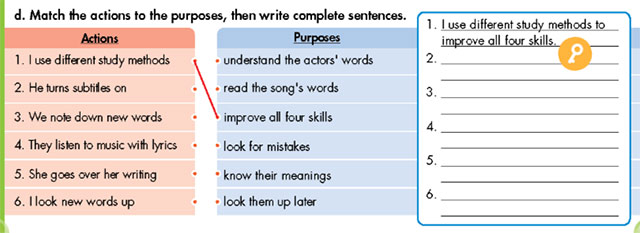
Gợi ý đáp án
1. I use different study methods to improve all four skills.
2. He turns subtitles on to understand the actors’ words.
3. We note down new words to look them up later.
4. They listen to music with lyrics to read the song’s words.
5. She goes over her writing to look for mistakes.
6. I look new words up to know their meanings.
e. In pairs: Use the action from Task d. again and make new sentences using your own ideas for the purpose.
(Theo cặp: Sử dụng lại hành động ở Bài tập d và đặt câu mới sử dụng ý tưởng của riêng bạn cho mục đích đó.)

Gợi ý đáp án
A: I use different study methods to enhance my understanding of complex topics.
B: He turns subtitles on to practice his reading skills while watching foreign films.
A: We note down new words to expand our vocabulary and express ourselves more precisely.
B: They listen to music with lyrics to immerse themselves in the language and improve their listening comprehension.
A: She goes over her writing to refine her style and develop her own voice as a writer.
B: I look new words up to integrate them into my daily conversations and written communication.
Pronunciation
a. Stress content words in a sentence.
(Nhấn trọng âm vào các từ mang nội dung trong một câu.)
b. Listen to the sentences and focus on the underlined words.
(Nghe các câu và tập trung vào những từ được gạch chân.)

c. Listen and cross out the sentence that doesn't follow the note in Task a.
(Nghe và gạch bỏ câu không theo ghi chú ở bài tập a.)

Gợi ý đáp án
Bỏ câu “I use subtitles to improve my pronunciation.”
d. Read the sentences with the rhythm noted in Task a. to a partner.
(Đọc các câu với nhịp điệu được ghi ở Bài tập a với bạn của em.)
Practice
a. In pairs: Take turns asking and answering about English study methods.
(Theo cặp: Lần lượt hỏi và trả lời về phương pháp học tiếng Anh.)
Gợi ý đáp án
A: What method can we use?
B: We can read interesting books.
A: How will that help?
B: We can note down new words and look them up later.
A: That's a great idea!
***
A: What method can we use?
B: We can watch TV shows or movies.
A: How will that help?
B: We can turn on subtitles to understand new words.
A: That's a smart way to learn!
***
A: What method can we use?
B: We can keep a notebook.
A: How will that help?
B: We can go over our writings and find mistakes.
A: That sounds like a productive way to improve our writing skills!
b. Practice with your own ideas.
(Thực hành với ý tưởng của riêng bạn.)
Gợi ý đáp án
A: What method can we use?
B: We can participate in language exchange sessions.
A: How will that help?
B: We can practice speaking with native speakers and receive feedback on our language skills.
A: That's a fantastic way to improve our speaking fluency and gain cultural insights!
Speaking
FUN STUDY METHODS (NHỮNG PHƯƠNG PHÁP HỌC VUI NHỘN)
a. In pairs: Look at the pictures of fun ways to learn English. Say what the activities are and discuss the purpose of the study methods below and your own ideas.
(Theo cặp: Xem tranh về các cách học tiếng Anh thú vị. Cho biết các hoạt động đó là gì và thảo luận về mục đích của các phương pháp học tập dưới đây và ý tưởng của riêng bạn.)
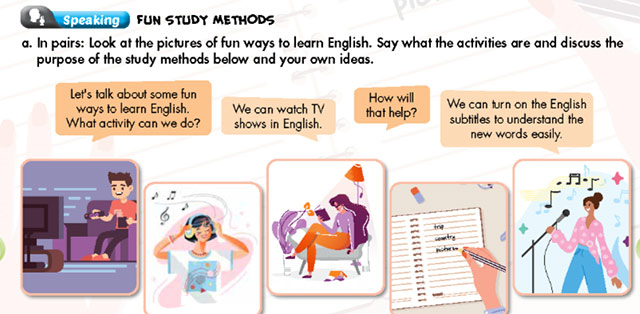
Gợi ý đáp án
A: Let’s talk about some fun ways to learn English. What activity can we do?
B: We can listen to English music.
A: How will that help?
B: Listening to English music can help improve our listening skills and pronunciation. We can also try to sing along with the lyrics to practice speaking English fluently.
A: What else can we do?
B: We can read books in English.
A: How will that help?
B: Reading books in English can enhance our vocabulary and comprehension skills. We can start with books at our level and gradually move on to more challenging ones to improve our reading abilities.
A: What another activity can we do?
B: We can write in English.
A: How will that help?
B: Writing in English allows us to practice grammar, sentence structure, and spelling. We can keep a journal, write short stories, or even participate in online forums to receive feedback from others and improve our writing skills.
A: What else can we do?
B: We can sing English songs.
A: How will that help?
B: Singing English songs can be a fun way to practice pronunciation, intonation, and rhythm. We can choose songs with clear lyrics and sing along with them to improve our speaking and listening skills simultaneously. Plus, it's an enjoyable way to learn new vocabulary and expressions.
Chọn file cần tải:
Theo Nghị định 147/2024/ND-CP, bạn cần xác thực tài khoản trước khi sử dụng tính năng này. Chúng tôi sẽ gửi mã xác thực qua SMS hoặc Zalo tới số điện thoại mà bạn nhập dưới đây:













 Đề thi giữa kì 2 lớp 9
Đề thi giữa kì 2 lớp 9
 Đề thi học kì 2 Lớp 9
Đề thi học kì 2 Lớp 9
 Đề thi giữa kì 1 lớp 9
Đề thi giữa kì 1 lớp 9
 Đề thi học kì 1 Lớp 9
Đề thi học kì 1 Lớp 9
 Toán 9
Toán 9
 Toán 9 Kết nối tri thức
Toán 9 Kết nối tri thức
 Toán 9 Cánh Diều
Toán 9 Cánh Diều
 Toán 9 Chân trời sáng tạo
Toán 9 Chân trời sáng tạo
 Văn 9 Kết nối tri thức
Văn 9 Kết nối tri thức









